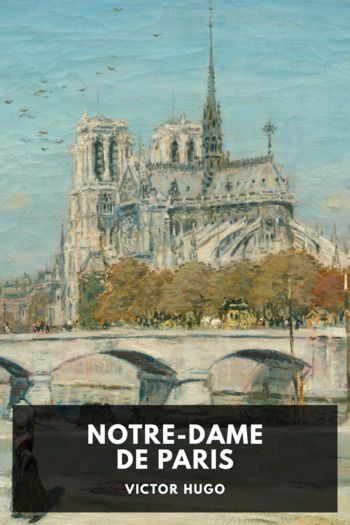Notre-Dame de Paris - Victor Hugo (diy ebook reader .txt) 📗

- Author: Victor Hugo
Book online «Notre-Dame de Paris - Victor Hugo (diy ebook reader .txt) 📗». Author Victor Hugo
It was, in fact, the king’s troops who had arrived. The vagabonds behaved bravely. They defended themselves like desperate men. Caught on the flank, by the Rue Saint-Pierre-aux-Boeufs, and in the rear through the Rue du Parvis, driven to bay against Notre-Dame, which they still assailed and Quasimodo defended, at the same time besiegers and besieged, they were in the singular situation in which Comte Henri Harcourt, Taurinum obsessor idem et obsessus, as his epitaph says, found himself later on, at the famous siege of Turin, in 1640, between Prince Thomas of Savoy, whom he was besieging, and the Marquis de Leganez, who was blockading him.
The battle was frightful. There was a dog’s tooth for wolf’s flesh, as P. Mathieu says. The king’s cavaliers, in whose midst Phoebus de Châteaupers bore himself valiantly, gave no quarter, and the slash of the sword disposed of those who escaped the thrust of the lance. The outcasts, badly armed, foamed and bit with rage. Men, women, children, hurled themselves on the cruppers and the breasts of the horses, and hung there like cats, with teeth, finger nails and toe nails. Others struck the archers’ in the face with their torches. Others thrust iron hooks into the necks of the cavaliers and dragged them down. They slashed in pieces those who fell.
One was noticed who had a large, glittering scythe, and who, for a long time, mowed the legs of the horses. He was frightful. He was singing a ditty, with a nasal intonation, he swung and drew back his scythe incessantly. At every blow he traced around him a great circle of severed limbs. He advanced thus into the very thickest of the cavalry, with the tranquil slowness, the lolling of the head and the regular breathing of a harvester attacking a field of wheat. It was Clopin Trouillefou. A shot from an arquebus laid him low.
In the meantime, windows had been opened again. The neighbors hearing the war cries of the king’s troops, had mingled in the affray, and bullets rained upon the outcasts from every story. The Parvis was filled with a thick smoke, which the musketry streaked with flame. Through it one could confusedly distinguish the front of Notre-Dame, and the decrepit Hôtel-Dieu with some wan invalids gazing down from the heights of its roof all checkered with dormer windows.
At length the vagabonds gave way. Weariness, the lack of good weapons, the fright of this surprise, the musketry from the windows, the valiant attack of the king’s troops, all overwhelmed them. They forced the line of assailants, and fled in every direction, leaving the Parvis encumbered with dead.
When Quasimodo, who had not ceased to fight for a moment, beheld this rout, he fell on his knees and raised his hands to heaven; then, intoxicated with joy, he ran, he ascended with the swiftness of a bird to that cell, the approaches to which he had so intrepidly defended. He had but one thought now; it was to kneel before her whom he had just saved for the second time.
When he entered the cell, he found it empty.
Book XI I The Little ShoeLa Esmeralda was sleeping at the moment when the outcasts assailed the church.
Soon the ever-increasing uproar around the edifice, and the uneasy bleating of her goat which had been awakened, had roused her from her slumbers. She had sat up, she had listened, she had looked; then, terrified by the light and noise, she had rushed from her cell to see. The aspect of the Place, the vision which was moving in it, the disorder of that nocturnal assault, that hideous crowd, leaping like a cloud of frogs, half seen in the gloom, the croaking of that hoarse multitude, those few red torches running and crossing each other in the darkness like the meteors which streak the misty surfaces of marshes, this whole scene produced upon her the effect of a mysterious battle between the phantoms of the witches’ sabbath and the stone monsters of the church. Imbued from her very infancy with the superstitions of the Bohemian tribe, her first thought was that she had caught the strange beings peculiar to the night, in their deeds of witchcraft. Then she ran in terror to cower in her cell, asking of her pallet some less terrible nightmare.
But little by little the first vapors of terror had been dissipated; from the constantly increasing noise, and from many other signs of reality, she felt herself besieged not by spectres, but by human beings. Then her fear, though it did not increase, changed its character. She had dreamed of the possibility of a popular mutiny to tear her from her asylum. The idea of once more recovering life, hope, Phoebus, who was ever present in her future, the extreme helplessness of her condition, flight cut off, no support, her abandonment, her isolation—these thoughts and a thousand others overwhelmed her. She fell upon her knees, with her head on her bed, her hands clasped over her head, full of anxiety and tremors, and, although a gypsy, an idolater, and a pagan, she began to entreat with sobs, mercy from the good Christian God, and to pray to our Lady, her hostess. For even if one believes in nothing, there are moments in life when one is always of the religion of the temple which is nearest at hand.
She remained thus prostrate for a very long time, trembling in truth, more than praying, chilled by the ever-closer breath of that furious multitude, understanding nothing of this outburst, ignorant of what was being plotted,





Comments (0)